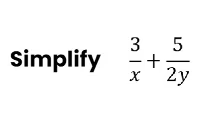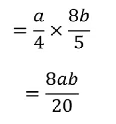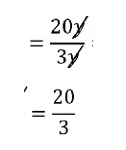
Mastering Algebraic Fractions | Cambridge IGCSE Mathematics
[Please watch the video attached at the end of this blog for a visual explanation on Mastering Algebraic Fractions]
What are Algebraic Fractions?
Algebraic fractions are fractions with at least one variable, meaning that they have x, y or another similar term/ terms.
Example 1: Adding Algebraic Fractions

When an algebraic fraction like this is given, what must be done first is to find the lowest common multiple of the denominators.
In this example therefore, the denominators are x and 2_y_, hence the lowest common multiple will be 2_xy_.
We take that value and we convert both the fractions into that common denominator.
This first fraction will be multiplied by 2_y_ and the second fraction will be multiplied by x.


Then the denominator becomes the same, and we solve this algebraic fraction pretty much the same way we would a normal fraction. In this case it appears that we have to add the numerators.

Example 2: Subtracting Algebraic Fractions

Here too, we first need to find the lowest common multiple of these two denominators to get the common denominator.
Since one fraction has 7 as the denominator and the other fraction has 2, we can multiply them together to get the lowest common multiple and the common denominator. Therefore we multiply 7 into 2 (for the first fraction), and then we multiply 2 into 7 (for the second fraction).

We then expand the brackets for the numerators, giving 4x + 2 for the first fraction and 7x + 14 for the second fraction.

Be very careful when solving this from now on because there is a negative or minus sign in front of the second fraction, which means that when this subtraction is carried over, it has to be done so for both terms 7x and 14. Therefore the second fraction’s numerators will actually be - 7x and - 14.

We can then simplify the “like” terms. This means that 4x - 7x becomes - 3x, and + 12 - 14 becomes - 12. The final answer will then look like this:

Example 3: Multiplying Algebraic Fractions

When multiplying fractions, there is no need to find the common denominator. When it comes to multiplying algebraic fractions, much like normal fractions, the denominators can be multiplied together.
In this example therefore, we can simply multiply the numerators 8_b_ and a together, and that gives us 8_ab_. Similarly, the denominators are 5 multiplied by 4 which gives us 20.

If there is a possibility for the answer to be simplified, take that chance! It is always good to leave the answer in the simplest form possible, unless of course the question says otherwise ?.
In this example, 8 and 20 have a factor of 4, and we can simplify this down to ⅖ .

Example 4: Dividing Algebraic Fractions

We then multiply the denominator terms together and the numerator terms together. When doing so we can see that the y terms will cancel each other off, resulting in 20⁄3 as the final answer.

Example 5: Factorising and Simplifying Algebraic Fractions

There are also questions like the one above which are a bit more complicated, and these can be solved using factorisation and simplification.
In this example, we can actually factorise this by taking 3_a_ out, which then keeps (6 - b) within brackets. This can be used to cancel off the denominator, so rather than keeping 3_a_/6_a_2, we can simplify it to (6 - b)/ 2_a_


Watch the video for another similar example!
Mastering Algebraic Fractions
Algebraic fractions are simple once you get the hang of the rules and you practise as many questions as you can find. You can find some questions in this quiz to check where you stand!
If you are struggling with IGCSE revision or the Mathematics subject in particular, you can reach out to us at Tutopiya to join revision sessions or find yourself the right tutor for you.
Watch the video below for a visual explanation of the lesson on mastering algebraic fractions!
Written by
Tutopiya Team
Educational Expert
Related Articles

Best Female-Only International Schools in UAE (2025–2026 Guide)
Discover the top female-only international schools in the UAE. Compare girls-only schools in Dubai, Abu Dhabi & Sharjah offering IGCSE, IB & A-Level curricula — fees, facilities & admissions.

Female-Only Universities & Colleges — A Complete Guide for UAE Parents
Discover the best female-only universities and colleges worldwide, including options in the UAE and Middle East. A comprehensive guide for parents seeking single-gender higher education for their daughters.

Benefits of Having a Trial Class Before Booking a Tutor for Online Classes
Discover why taking a trial class before committing to an online tutor is essential. Learn how free trial lessons help you evaluate teaching quality, compatibility, and value for money.
